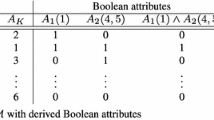Abstract
Owing to the rapid growth in the sizes of databases, potentially useful information may be embeded in a large amount of data. Knowledge discovery is the search for semantic relationships which exist in large databases. One of the main problems for knowledge discovery is that the number of possible relationships can be very large, thus searching for interesting relationships and reducing the search complexity are important. The relationships can be represented as rules which can be used in efficient query processing. We present a technique to analyze relationships among attribute values and to derive compact rule set. We also propose a mechanism and some heuristics to reduce the search complexity for the rule derivation process. An evaluation model is presented to evaluate the quality of the derived rules. Moreover, in real world, databases may contain uncertain data. We also propose a technique to analyze the relationships among uncertain data and derive probabilistic rules.
Similar content being viewed by others
Explore related subjects
Discover the latest articles, news and stories from top researchers in related subjects.References
Agrawal, R., Ghosh, S., Imielinski, T., Iyer, B. and Swami, A. An Interval Classifier for Database Mining Applications. In Proceedings of VLDB, pages 560–573, Vancouver, British Columbia, 1992.
Agrawal, R., Imielinski, T. and Swami, A. Mining Association Rules Between Sets of Items in Large Databases. In Proceedings of ACM SIGMOD, pages 207–216, 1993.
Agrawal, R. and Srikant, R. Fast Algorithm for Mining Association Rules. In Proceedings of VLDB, pages 487–499, 1994.
Cai, Y., Cercone, N. and Han, J. Attribute-Oriented Induction in Relational Databases. In Knowledge Discovery in Databases. Menlo Park, CA: AAAI/MIT, pages 213–228, 1990a.
Cai, Y., Cercone, N. and Han, J. Learning Characteristic Rules from Relational Databases. In Computational Intelligence, II, F.Gardin and G. Mauri (Editors), pages 187–196, 1990b.
Cai, Y., Cercone, N. and Han, J. An Attribute-Oriented Approach for Learning Classification Rules from Relational Databases. In Proceedings of Data Engineering, Los Angeles, pages 281–288, Feb 1990c.
Chu, W., Lee, R.C. and Chen, Q., Using Type Inference and Induced Rules to Provide Intensional Answers. In Proceedings of Data Engineering, pages 396–403, 1991.
Dietterich, T.G. and Michalski, R.S. A comparative review of selected methods for learning from examples. In Machine Learning: An Artifical Intelligence Approach, Vol. 1, pages 41–82, 1983.
Hammer, M. and Zdondik, S.B. Knowledge-based query processing. In Proceedings of VLDB, pages 137–146, 1980.
Han, J., Cai, Y. and Cercone, N. Knowledge Discovery in Databases: An Attribute-Oriented Approach. In Proceedings of VLDB, pages 547–559, 1992.
Han, J., Cai, Y. and Cercone, N. Data-Driven Discovery of Quantitative Rules in Relational Databases. In IEEE Trans. Knowledge and Data Engineering, pages 29–40, 1993.
Imielinski, T. Intelligent Query Answering in Rule-Based Systems. Journal of Logic Programming, 4:229–257, 1987.
Jarke, M. Semantic Query Optimization in Expert Systems and Database Systems. In Proceedings of Expert Database Systems, pages 467–482, 1984.
Malley, C. and Zdonik, S. A Knowledge-Based Approach to Query Optimization. In Proceedings of Expert Database Systems, pages 243–257, 1986.
Michalski, R.S. A theory and Methodology of Inductive Learning. In Machine Learning: An Artifical Intelligence Approach, 1:83–134, 1983.
Motro, A. Using Integrity Contraints to Provide Intensional Answers to Relational Queries. In Proceedings of VLDB, 1989.
Oosthuizen, G. Lattice-Based Knowledge Discovery. In Knowledge Discovery in Databases. Menlo Park, CA: AAAI/MIT, pages 221–235, 1991.
Park, J.S., Chen, M.S. and Yu, P.S. An Effective Hash-Based Algorithm for Mining Assocation Rules. In Proceedings of VLDB, 24(2): 175–186, 1995.
Pawlak, Z. Rough Sets. In Journal of Computer and Informations Sciences, 11(5):341-356, 1982.
Quinlan, J.R. Induction of decision trees. In Machine Learning, 1:81–106, 1986.
Siegeland, M., Sciore, E. and Salveter, S. A. Method for Automatic Rule Derivation to Support Semantic Query Optimization. In ACM Trans. Database Systems, pages 563–600, 1992.
Siegel, M. Automatic Rule Derivation for Semantic Query Optimization. In Proceedings of Expert Database Systems, pages 371–385, 1988.
Tseng, F.S.C., Chen, A.L.P. and Yang, W.P. Answering Heterogeneous Database Queries with Degrees of Uncertainty. In Distributed and Parallel Databases, 1:281–302, 1993.
Chakravarthy, U., Fishman, D. and Minker, J. Semantic Query Optimization in Expert Systems and Database Systems. In Proceedings of Expert Database Systems, pages 326–340, 1984.
Winston, P.H. Learning by Building Identification Trees. In Artificial Intelligence, pages 423–432, 1992.
Yen, S.J. and Chen, A.L.P. Neighborhood/Conceptual Query Answering with Imprecise/Incomplete Data. In Proceedings of Entity-Relationship Approach, pages 151–162, 1993.
Yen, S.J. and Chen, A.L.P. An Efficient Algorithm for Deriving Compact Rules from Databases. In Proceedings of Database Systems for Advanced Application, 1995.
Yu, C. and Sun, W. Automatic Knowledge Acquisition and Maintenance for Semantic Query Optimization. In IEEE Trans. Knowledge and Data Engineering, pages 362–375, 1989.
Ziarko, W. The Discovery Analysis, and Representation of Data Dependencies in Databases. In Knowledge Discovery in Databases. Menlo Park, CA: AAAI/MIT, pages 195–209, 1991.
Author information
Authors and Affiliations
Rights and permissions
About this article
Cite this article
Yen, SJ., Chen, A.L.P. The analysis of relationships in databases for rule derivation. J Intell Inf Syst 7, 235–259 (1996). https://doi.org/10.1007/BF00125369
Issue Date:
DOI: https://doi.org/10.1007/BF00125369




